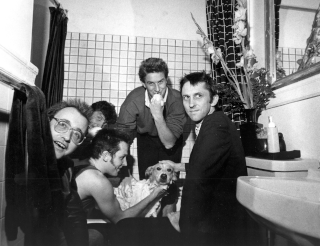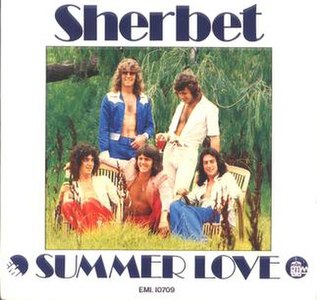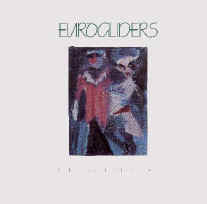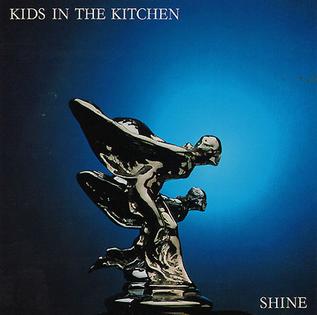Related Research Articles

Cold Chisel are an Australian pub rock band, which formed in Adelaide in 1973 by mainstay members Ian Moss on guitar and vocals, Steve Prestwich on drums and Don Walker on piano and keyboards. They were soon joined by Jimmy Barnes on lead vocals and, in 1975, Phil Small became their bass guitarist. The group disbanded in late 1983 but subsequently reformed several times. Musicologist Ian McFarlane wrote that they became "one of Australia's best-loved groups" as well as "one of the best live bands", fusing "a combination of rockabilly, hard rock and rough-house soul'n'blues that was defiantly Australian in outlook."

John Inglis Young, OAM, known professionally as John Paul Young, is an Australian pop singer who had his 1978 worldwide hit with "Love Is in the Air". His career was boosted by regular appearances as a performer and guest host on Countdown, a 1974–1987 TV series for Australia's national broadcaster ABC. Besides "Love Is in the Air", Young had top ten chart success in Germany and the Netherlands with "Standing in the Rain" and four other top ten hits in South Africa, including No. 1 hits with "I Hate the Music" in 1976 and "Yesterday's Hero" in 1975.
Stephen Donald Cummings is an Australian rock singer and songwriter. He was the lead singer of Melbourne-based rock band the Sports from 1976 to 1981, followed by a solo career which has met with critical acclaim but has had limited commercial success. He has written two novels, Wonderboy (1996) and Stay Away from Lightning Girl (1999), and a memoir, Will It Be Funny Tomorrow, Billy (2009). In 2014 a documentary film, Don't Throw Stones, based on his memoir premiered as part of the Melbourne International Film Festival.

Business as Usual is the debut studio album by Australian new wave band Men at Work, which was released in November 1981 in Australia, and April 1982 in the United States. It spent nine weeks at the top of the Australian Kent Music Report Albums Chart from December 1981 through to March 1982. The Australian version had a black and white cover design; overseas releases had a similar design, but in a black and yellow colour scheme. Business as Usual was one of the most successful albums internationally by an Australian group. It spent an unprecedented 15 weeks at No. 1 on the US Billboard 200 from late 1982 to early 1983; and five weeks at No. 1 in the United Kingdom Albums Chart in early 1983. Business as Usual was also one of the highest selling Australian albums in the early 1980s, with 6 million copies shipped in the US.

Mental As Anything are an Australian new wave and pop rock band that formed in Sydney in 1976. Its most popular line-up was Martin Plaza on vocals and guitar; Reg Mombassa on lead guitar and vocals; his brother Peter "Yoga Dog" O'Doherty on bass guitar and vocals; Wayne de Lisle on drums; and Andrew "Greedy" Smith on vocals, keyboards and harmonica. Their original hit songs were generated by Mombassa, O'Doherty, Plaza and Smith, either individually or collectively; they also hit the Australian charts with covers of songs by Roy Orbison, Elvis Presley, and Chuck Berry.

The Dynamic Hepnotics were an Australian soul, blues and funk band which formed in 1979 and disbanded in 1986. Mainstay, lead vocalist and front man, "Continental" Robert Susz formed the group in Sydney. They had chart success on the Australian Kent Music Report Singles Chart with a top 5 single, "Soul Kind of Feeling" in 1984. It was followed by "Gotta Be Wrong " which reached the top 20 in 1985. Their album, Take You Higher, reached the top 20 on the related Albums Chart in June. In 1986, "Soul Kind of Feeling" won the APRA Music Award for 'Most Performed Australasian Popular Work'.
Mondo Rock are an Australian rock band, formed in November 1976 in Melbourne, Victoria. Singer-songwriter Ross Wilson founded the band, following the split of his previous band Daddy Cool. Guitarist Eric McCusker, who joined in 1980, wrote many of the band's hits, and along with Wilson formed the core of the group. They are best known for their second album, Chemistry, which was released in July 1981 and peaked at number 2 on the Australian Kent Music Report. Their song "Come Said the Boy" peaked at number 2 in Australia in 1983.
John Martin Armiger was an Australian musician, record producer and composer. He was one of the singer-songwriters and guitarists with Melbourne-based rock band the Sports from August 1978 to late 1981, which had Top 30 hits on the Kent Music Report Singles Chart with, "Don't Throw Stones" (1979), "Strangers on a Train" (1980) and "How Come" (1981); and Top 20 albums with Don't Throw Stones, Suddenly and Sondra (1981).

Whispering Jack is the twelfth studio album by Australian adult contemporary pop singer John Farnham. It was produced by Ross Fraser and released on 29 September 1986, peaking at No. 1 on the Australian Kent Music Report albums chart. Whispering Jack became the second-best-selling album in Australia, behind only Meat Loaf's album Bat Out of Hell, and the highest-selling album in Australia by an Australian artist―24× platinum, indicating over 1.68 million copies sold; it remains the third-best-selling album of all time in Australia, as Shania Twain's Come On Over eventually eclipsed it. It spent 25 weeks at the No. 1 spot on the albums chart during 1986–1987, it was awarded the 1987 ARIA Award for Album of the Year, and it was the best-charting album for the decade of the 1980s in Australia. It was the first Australian-made album to be released on compact disc within Australia. One of Farnham's biggest hits, "You're the Voice", was issued as the lead single from the album and peaked at No. 1 on the Kent Music Report singles chart.

"Summer Love" is a song by Australian pop group, Sherbet and was released in March 1975. It became their first number-one hit on the Australian Kent Music Report Singles Chart. The song was promoted on the newly aired ABC TV pop series, Countdown, which gave it wide exposure. From early 1975 the group made more appearances on the show than any other band in the programme's history. In October, at the King of Pop Awards, "Summer Love" won the Most Popular Australian Single, the band won Most Popular Australian Group and their lead singer, Daryl Braithwaite, won the King of Pop award.

"The One Thing" is a song by Australian rock group INXS, released in July 1982 as the first single ahead of their third studio album, Shabooh Shoobah, which appeared in October that year.

Vanda & Young were an Australian songwriting and producing duo composed of Harry Vanda and George Young. They performed as members of 1960s Australian rock group the Easybeats where Vanda was their lead guitarist and backing singer and Young was their rhythm guitarist and backing singer. Vanda & Young co-wrote most of the Easybeats' later hits including their international hit "Friday on My Mind" and they were the record producers for the group from 1967. Young was the older brother of Malcolm and Angus Young of the hard rock band AC/DC and also the record producer behind several of the band's biggest albums.

Pink Suit Blue Day is the debut album by Australian rock band Eurogliders, released in 1982. Their debut single, "Without You", was released in June and entered the top 40 of the Australian Kent Music Report singles chart. A follow-up single, "Laughing Matter" in September did not chart.

"Out of Mind, Out of Sight" is the title single by Australian new wave rock band Models from their album of the same name. It was released in June 1985 and was their most successful single, which peaked at No. 1 on the Australian Kent Music Report Singles Chart. The album followed in August on Mushroom Records with Nick Launay, Reggie Lucas and Mark Opitz producing and reached No. 3 on the related albums chart.

"Billy Baxter" is a song by Australian rock group Paul Kelly and the Dots, released on 20 October 1980 as the lead single from the album Talk (1981). It was written by band members Paul Kelly and Chris Langman. It peaked at No. 38 on the Australian Kent Music Report Singles Chart. The song was produced by Joe Camilleri for Mushroom Records. In early November the group performed the track on national pop music TV show, Countdown – it was Kelly's first TV appearance. The song's subject, Billy Baxter, is an Australian musician and was a long term member of Coodabeens Footy Show on ABC Radio National.
David Lawrence Mason is an Australian singer-songwriter and record producer originally from Dubbo. He is the founding mainstay of pop, rock group, The Reels. For the group, Mason wrote and sang their hit singles, "Love Will Find a Way", "Prefab Heart" (1980), "After the News", and "Shout and Deliver". He also wrote "Quasimodo's Dream", which was a non-charting single from May 1981. However, in May 2001, it was listed by Australasian Performing Right Association (APRA) at No. 10 of their Top 30 Australian songs of all time.

Simon Cyril Hussey is an Australian multi-instrumentalist, songwriter-arranger, record producer and audio engineer. In 1984 he formed Cats Under Pressure on keyboards with David Reyne on vocals and Mark Greig on guitar. On the Australian Crawl album Between a Rock and a Hard Place, Hussey co-wrote four tracks with the band's lead singer, James Reyne. In 1987 when James undertook his solo career, Hussey joined his backing band on keyboards, and co-wrote six tracks for James' debut self-titled album including top 10 hit singles, "Hammerhead" (October) and "Motor's Too Fast". In May 1988 Hussey was the producer, and provided keyboards and song writing, for Edge (November), the comeback album by Daryl Braithwaite (ex-Sherbet), which peaked at No. 1 on the ARIA Albums Chart for three weeks in mid-1989.
Bill and Boyd were a pop music duo from 1959 to 1989 consisting of William "Bill" Cate and William "Boyd" Robertson, both on lead vocals and lead guitar, which started recording in 1960. They began their careers in Wellington, New Zealand before relocating to Sydney by 1964. In 1968 they toured United States supporting The Supremes and Herb Alpert.

Shine is the debut studio album by Australian new wave, pop group Kids in the Kitchen. It was released on 20 May 1985 via Mushroom Records. It peaked at No. 9 in Australia and was certified platinum for shipment of 70,000 copies. The line-up for most of its tracks was Scott Carne on lead vocals, Bruce Curnow on drums, Craig Harnath on bass guitar, Claude Carranza on lead guitar and Alistair Coia on keyboards, with the producer Mark S. Berry working on seven of its ten tracks. It provided six singles, "Change in Mood" (1983), "Bitter Desire" (1984), "Something That You Said", "Shine", "Current Stand", and "My Life". The album was re-released internationally in 1986 as Kids in the Kitchen by Sire Records for the European and American markets.

"You Weren't in Love with Me" is a song by Australian singer-songwriter Billy Field. It was released in July 1981 as the second and final single from his debut studio album, Bad Habits. The song peaked at number one on the Australian Kent Music Report and entered the top 30 in New Zealand. At the APRA Music Awards of 1982, the song won Most Performed Australasian Popular Work.
References
- 1 2 3 4 5 6 7 8 McFarlane, Ian (2017). "Billy Field". The Encyclopedia of Australian Rock and Pop . Jenkins, Jeff (Foreword) (2nd ed.). Gisborne, VIC: Third Stone Press. p. 168. ISBN 978-0-9953856-0-3.
- ↑ "Gold Central Victoria". Archived from the original on 18 April 2015. Retrieved 7 April 2015.
- 1 2 "Where Are They Now? Billy Field". Newsletter. No. 94. Bmusic. 29 January 2006. Archived from the original on 27 September 2011. Retrieved 7 November 2018.
- 1 2 3 4 5 6 7 Kimball, Duncan (2008). "King Fox". Milesago Ice Productions. Archived from the original on 14 March 2009. Retrieved 7 November 2018– via Trove.
- ↑ Moore, Susan (10 June 1981). "Moore on Pop". The Australian Women's Weekly . Vol. 49, no. 1. p. 121. Retrieved 7 November 2018– via National Library of Australia. Note: includes a photo of Field.
- ↑ Field, Billy; Price, Tom (1981), Bad Habits, EMI, retrieved 8 November 2018
- 1 2 3 4 5 6 Kent, David (1993). Australian Chart Book 1970–1992 . St Ives, NSW: Australian Chart Book Ltd. ISBN 0-646-11917-6. Note: Used for Australian Singles and Albums charting from 1974 until Australian Recording Industry Association (ARIA) created its own charts in mid-1988. In 1992, Kent back calculated chart positions for 1970–1974.
- 1 2 3 4 5 Hung, Steffen. "Discography Billy Field". New Zealand Charts Portal. Hung Medien. Retrieved 7 November 2018.
- ↑ "Bad Habits". Australasian Performing Right Association . Retrieved 7 November 2018. Note: For additional work user may have to select 'Search again' and then 'Enter a title:' &/or 'Performer:'
- 1 2 Roberts, David (2006). British Hit Singles & Albums (19th ed.). London: Guinness World Records Limited. p. 199. ISBN 1-904994-10-5.
- 1 2 "You Weren't in Love with Me". Australasian Performing Right Association. Retrieved 7 November 2018. Note: For additional work user may have to select 'Search again' and then 'Enter a title:' &/or 'Performer:'
- ↑ "1982 APRA Music Award Winners". Australasian Performing Right Association - Australasian Mechanical Copyright Owners Society. Retrieved 9 September 2019.
- 1 2 3 Kent Music Report, No 393, 4 January 1982, which lists all singles and albums that reached gold or platinum status during 1981.
- ↑ Moore, Susan (19 August 1981). "Moore on Pop". The Australian Women's Weekly. Vol. 49, no. 11. p. 201. Retrieved 7 November 2018– via National Library of Australia.
- ↑ "Timespan: Coming Back Home, with 'Crystal Rock'". The Canberra Times . Vol. 57, no. 17, 161. 22 September 1982. p. 26. Retrieved 7 November 2018– via National Library of Australia.
- ↑ Milliner, Karen (29 November 1982). "Not Much Difference". The Canberra Times. Vol. 57, no. 17, 229. p. 14. Retrieved 8 November 2018– via National Library of Australia.
- ↑ Foster, Michael (16 November 1985). "Music: High Sierra travels with its own fans". The Canberra Times. Vol. 60, no. 18, 309. p. 7. Retrieved 8 November 2018– via National Library of Australia.
- ↑ Whitfield, Kathryn (4 May 1989). "Music Good Times: Dragon without the fire". The Canberra Times. Vol. 63, no. 19, 566. p. 30. Retrieved 8 November 2018– via National Library of Australia.
- ↑ "Billy Field | Credits". AllMusic . Retrieved 8 November 2018. Note: Some credits relate to a different Billy Field
- ↑ "Round and Round". The Canberra Times. Vol. 63, no. 19, 337. 15 September 1988. p. 35. Retrieved 8 November 2018– via National Library of Australia.
- ↑ "1982 APRA Music Award Winners". Australasian Performing Right Association (APRA) | Australasian Mechanical Copyright Owners Society (AMCOS). Retrieved 8 January 2023.
- ↑ "Countdown to the Awards" (PDF). Countdown. Australian Broadcasting Corporation. March 1987. Retrieved 16 December 2010.